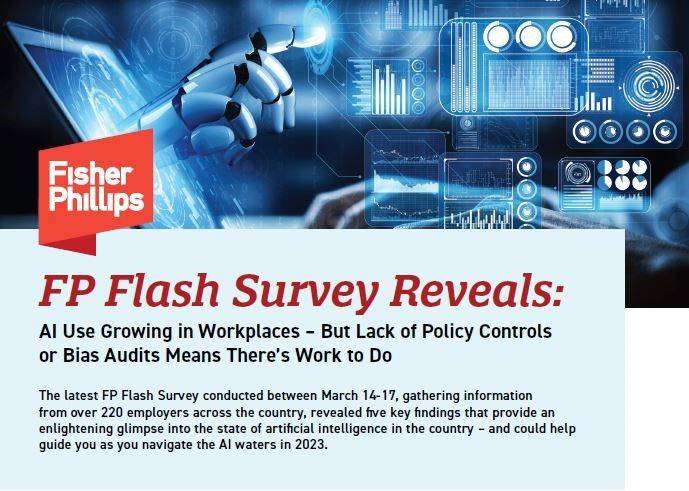FP Flash Survey Reveals: AI Use Growing in Workplaces – But Lack of Policy Controls or Bias Audits Means There’s Work to Do
Insights
4.05.23
While the number of employers using artificial intelligence (AI) will grow in 2023 – and those currently using it report increased efficiency and effective results – most companies don’t have workplace policies on AI and most users haven’t conducted a bias audit of their systems. That’s according to the latest FP Flash Survey conducted between March 14-17, gathering information from over 225 employers across the country. The survey revealed five key findings that provide an enlightening glimpse into the state of artificial intelligence in the workplace, and could help guide you as you navigate the AI waters in 2023.
If you want to dive deeper, you can click through here and see all the results. If you still want to engage further, join us for the launch of the biweekly Fisher Phillips AI Workplace Forum on April 12 where we’ll discuss these issues in more depth and provide you with an interactive space to ask questions and join the conversation.
1. A solid number of employers are using AI – and that number will grow in 2023.
27% of employers currently use AI in some aspect of their business.
The first finding wasn’t that surprising. More than a quarter of all respondents indicated that they employ some sort of artificial intelligence at their place of business. However, we wonder whether that number isn’t actually higher. We suspect a number of employers use some sort of AI without even realizing it.
A solid portion of non-users will explore its use in 2023.
And 25% of employers who don’t use AI expect to explore its use in 2023. Another 28% are resistant and say they won’t even explore it in the coming year, with the remainder (47%) are unsure about how they will approach it this year.
2. AI has been overwhelmingly effective and brings efficiency to the vast majority of users – and thus positively received by employees.
The overwhelming majority of respondents (73%) say that their use of AI has been effective, with 40% of those respondents reporting it has been “very” effective.
Meanwhile, only 10% report that AI has been ineffective for them, demonstrating the value it is bringing to the workplace.
By far, the key benefit realized with the use of AI has been increased efficiency. Businesses also report improved accuracy and cost savings – but don’t yet believe it has earned them an improved external reputation or an internal morale boost.
When we polled employers using AI about which benefits they have realized from the technology, we received a wide variety of responses.
- Increased efficiency 76%
- Improved accuracy 36%
- Cost savings 32%
- Better decision-making 14%
- Recruitment and retention benefits 12%
- Improved customer satisfaction 10%
- Improved reputation and prestige 7%
- Increased employee morale 5%
More than half of employers (57%) said AI has been received positively by their employees, with 40% of them report it has been “very” positively received.
There may be a misperceived notion that employees will not appreciate the introduction of AI into the workplace, whether it’s because of a concern that they will fear robots are coming for their jobs or just because they might be fearful of adapting to new technology. But the survey results from those who have deployed AI at work show just the opposite. A large majority of workers have received it well, with only 7% of respondents saying it has been received negatively. (And 36% of respondents say their employees have been neutral about it.)
3. Employers have varied uses for AI – but there are some underutilized areas.
Recruiting, sales, and marketing are the most common reasons for businesses to use AI. It is underutilized in compliance, retention, and compensation.
Most common uses
- HR Recruiting (48%)
- Sales and Marketing (46%)
Often used
- Operations and Logistics (32%)
- Customer Service (24%)
- Finance and Accounting (24%)
Used sparingly
- Knowledge Management (14%)
- HR Employee Performance (12%)
Underutilized
- Compliance (9%)
- HR Retention (5%)
- HR Compensation (5%)
4. Those who don’t use AI don’t know where to start.
There are a lot of reasons why the majority of employers aren’t yet using AI – but the main one is they don’t know where to start.
We polled employers who are not using AI about why they aren’t using it. And while there are varied reasons, it might not be surprising that the technology is so new and has so many applications for use that many businesses just simply don’t know where to start.
- Unsure where to start 40%
- Reliability concerns 29%
- Privacy concerns 28%
- Cost 26%
- Lack of skilled personnel 26%
- Ethical or regulatory concerns 26%
- Morale issues 20%
5. There is work to be done: most companies haven’t conducted a bias audit, and most employers don’t have an AI policy for their workers.
Only 16% of AI users have conducted a bias audit to ensure it is acting appropriately, while 84% either haven’t conducted one (45%) or aren’t sure if they have (39%).
Among the concerns identified by government regulators and certain jurisdictions like New York is the concept that AI usage could lead to bias in the workplace. It is for this reason that employers should start looking into the use of such bias audits in 2023.
Only 18% of employers have a workplace policy regarding employee use of AI.
And finally, even if your company isn’t using AI on a formal basis, there’s a good chance that your employees are. And this could lead to problems. Developing a set of policies addressing the use of AI in the workplace and touching on privacy, confidentiality, accuracy, bias, and document creation – just to name a few issues – should be something else to examine when laying out your 2023 plans.
Want to learn more?
If you want to dive deeper, you can click through here and see all the results. If you still want to engage further, join us for the launch of the biweekly Fisher Phillips AI Workplace Forum on April 12 where we’ll discuss these issues in more depth and provide you with an interactive space to ask questions and join the conversation.
Conclusion
If you have questions about the best way to integrate AI into your workplace, contact your Fisher Phillips attorney, the authors of this Insight, or any attorney on our Artificial Intelligence Practice Group. We will continue to monitor further developments and provide updates on this and other workplace law issues, so make sure you are subscribed to Fisher Phillips’ Insight System to gather the most up-to-date information.
Related People
-
- Richard R. Meneghello
- Chief Content Officer
-
- John M. Polson
- Chairman & Managing Partner



